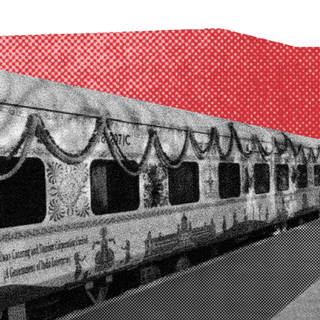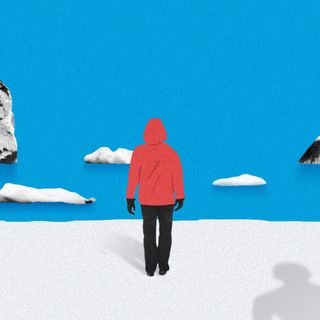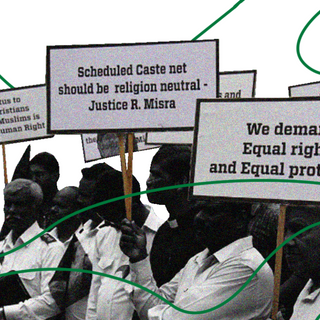
How Bisexual Erasure Undermines What It Means to Be Queer
Assessing the validity claims about bisexuality through their public behavior shows a deeper flaw in how we understand sexuality.

This week, rapper Cardi B had to defend herself from a Twitter user, who accused her of being one of few “[c]elebrities that came out as bisexual but never dated someone of the same gender.” In responding to this charge, Cardi B said she’d been with women before, even revealing that she’d had a girlfriend in high school. But the fact that she had to answer to this charge with details about her life at all speaks to a culture of bisexual erasure online and offline — where claiming any kind of queer identity necessitates performance or disclosure in order to be validated. Billie Eilish is similarly subject to intense scrutiny for possibly being bi — one that is guided by expected norms that doesn’t just undermine her privacy, but further contributes to bisexual erasure by subjecting it to misplaced assumptions. A confluence of celebrity culture, internet culture, and even the history of queer struggles have ended up failing bisexual people — in ways that harms the queer community itself.
Demanding that queer people make their entire dating histories, sex lives, and preferences publicly known is a form of bi erasure — one that an internet culture bent on being vocal about identity has fostered. It implicitly implies a sense of ownership and entitlement that the general public has over bisexual people’s bodies — and joins the ranks of other ways through which bisexual women are commodified, like unicorn hunting. Remember Obama famously admitting to reading Foucault and Virginia Woolf to pick up the “ethereal bisexual”? It’s an innocuous observation but it speaks to not just a vibe that bisexual people are presumed to have, but a gaze they’re subjected to, making them objects of scrutiny and surveillance both within straight and queer communities. And in the age of social media and hypervisibility, it makes coming out as bi messy, fraught, and harmful.
The critique of Cardi B, moreover, sounds a lot like an accusation of queerbaiting, but “…there’s something off about accusing a person of queerbaiting based on how they express themselves publicly,” as The Swaddle noted earlier, about how Harry Styles was accused of queer-baiting. Incidentally, Styles was among the other celebrities called out along with Cardi B for never publicly dating someone of the same gender.
But bisexuality isn’t easily slotted into existing forms of understanding queer culture, as a whole. Contrary to perceptions that bisexual people are “both straight and gay” or are merely “experimenting,” research found that bisexual individuals have a distinct, implicit bisexual identity that’s different from how gay, lesbian, or straight people perceive and identify themselves. This means that Internet culture demanding a certain performance of queerness from queer folk homogenizes very distinct identities under the same umbrella. But Internet culture merely inherited a culture of erasure from what preceded it: a cultural struggle to define queerness and mobilize against pain, marginalization, and harm. While it became necessary to draw clear boundaries, those who complicated those lines remained sidelined not just politically, but also culturally. But this doesn’t just harm bisexual people — it undermines queerness itself.
Related on The Swaddle:
What People Get Wrong About Bisexuality
“Unlike sexuality, that might seem to allow for clear distinctions of categorization, sex remains unruly… Unpacking queer, naming its constitutive parts and the ways these situate us in relation to social harms and privileges means being much more explicit about what, who, and why we do what we do sexually, as a way of investigating how sex functions as a regulatory force, and it means getting way more specific about what behaviors, communities, identities, and politics get subsumed, interrogated, or championed under the banner of queer,” notes gender studies scholar Juana María Rodríguez.
When we interrogate celebrities who’ve publicly already come out as bisexual, we impose sexuality as a regulatory force, demanding that they conform to a set of expected behaviors and rules, or risk being invalidated completely. By extension, anyone else who identifies as bisexual, too, is expected to conform to the same norms.
“Bisexuality is an often invisible identity. Heterosexual and homosexual communities contribute to bisexual erasure, acting in concert to protect a binary system that is complicated and disrupted by the possibility and presence of bisexuality,” notes another analysis on bisexual erasure — not only in mainstream media, but within queer communities too.
Over time, cultural anxieties around sexuality have culminated in a situation where a person is either presumed heterosexual, or homosexual, based on their overt behaviors and signifiers. “Bisexuals in relationships often blend into the sexual orientation dictated by that relationship, rather than retaining their status as bisexuals,” the study had noted. And this is the assumption implicit in social media call-outs of celebrities: if they’ve only been seen dating the “opposite” gender (itself a misnomer), they must be straight — and, of course, lying. But the argument goes the other way too: when celebrities signify queerness, they’re accused of straight-passing, or accessing the privilege of heterosexuality.
Scholars have noted that the insistence on maintaining the heterosexual-homosexual binary in this way is a social construct — if bisexual people aren’t visible, it’s not for a lack of numbers. Kenji Yoshino observed that an “epistemic contract” between people who are straight and gay ensures that sexual orientation remains a stable category, sex is still an axis of identity, and monogamy is upheld. The existence of bisexuality threatens all three assumptions, making its erasure in popular culture one that’s designed to maintain the status quo.
Related on The Swaddle:
NBC Premieres ‘A Little Late With Bisexual Woman Of Color’
As a result, bisexual people become an easy target for accusations of “fence-sitting” or “duplicity” by straight and gay people, both. “[Q]ueer identity politics has necessarily involved constructing definitions of queer identities whose content is characterized by the reversal of constructions of heterosexuality. While this has facilitated coherence among queers, and an oppositional stance toward heterosexism, it has also had the effect of closing off certain avenues of inquiry into queer sexuality,” notes scholar Stacy Young.
More troublingly, it speaks to a larger culture of disbelief around bisexual people’s experiences — and their own articulation of truth. “In publicly avowing one’s gender identity (or, onmy view, their sexual orientation), they are staking a social claim — they are authorizing how they want to be seen and treated in the social domain… it is an ethical matter that bi-identified people and others have the ability to determine and disclose (or not) their sexual orientation. Being denied this constitutes a violation in a morally significant way, insofar as it amounts to a violation of autonomy, and a violation of their ability to determine how their sexuality will be understood in the social realm,” writes Heather Stewart, cutting to the heart of what makes bisexual erasure so harmful.
It not only disavows the truth of what an individual chooses to disclose — it also actively demands a performance that may not conform to their identity, and sacrifices privacy to “prove” the validity of their speech.
Rohitha Naraharisetty is a Senior Associate Editor at The Swaddle. She writes about the intersection of gender, caste, social movements, and pop culture. She can be found on Instagram at @rohitha_97 or on Twitter at @romimacaronii.
Related


Employees of US Antarctic Research Program Allege Rampant Sexual Harassment
